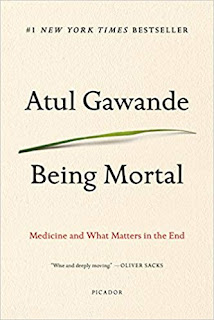
Welcome to the Lounge! This is a 55+ Community of books. I would like to introduce a new genre, "Silver Lit". The silver boomers advancing in age. have arrived! It's time to call attention to literature that may not be young in years, but "old" in wisdom. Like others, I am always looking for a good book, but also one I can relate to. I believe with age, comes wisdom and life experience, which adds texture to the book. To the publishing world, a wink, we are here and we are reading.
Sunday, February 24, 2019
Being Mortal By, Atul Gawande
Dr Gawande is a General Surgeon who contemplates the use of palliative care, to prolong the inevitable- death. The author begins the book stating that he was taught a variety of subjects in medical school, but mortality wasn't one of them. The author further addresses the point, stating that the purpose of medical school was to teach 'how to save lives, not how to "tend to their demise." Dr Gawande describes the scope of medicine as 'narrow' and essentially, the 'repair' of health, not the 'sustenance of soul.' The author struggles openly with patients and the ethical dilemma of 'saving' patients, knowing that additional treatment, will prolong their life, and then lead ultimately, to a painful death.
"People die only once. They have no experience to draw from. They need doctors and nurses who are willing to have the hard discussions and say what they have seen, and will help people prepare for what is to come- and escape a warehoused oblivion that few people want."
Dr Gawande illustrates the point, when he describes a patient, who was living a 'fantasy'. The patient was demanding treatment at all cost, to prevent the inevitable, death. Consequently, all preventive measures were utilized, and the patient suffered through all of the 'enhancements' applied to 'keep him alive.' After 14 days, the patient's son intervened, requesting the ventilator be removed.
In Chapter 5, "A Better Life" he offers examples of nursing homes, which allow birds, animals, community activities and community gardens. Dr Gawande provides examples of nursing homes, who are giving patients 'reasons to live' rather than 'warehousing them' till they die.
In Chapter 6, "Letting Go" the author describes death as a process, that involves preparation for the event, the final chapter. Understandably, once it is clear death is inevitable, the focus shifts to the quality of life, and how to strengthen relationships with family, friends and ways to maintain independence. It is a difficult subject to contemplate, as the author states, 'death may be the enemy, but it is also, the natural order of things. I knew these truths abstractly, but I didn't know them concretely." Once death is on the horizon, the author recommends having a concrete plan in place to move the 'abstraction' to reality.
The author ends the book with, "Hard Conversations" including his own, with his father, who requested 'no ventilators and no suffering.' Dr Gawande states there was comfort in knowing what his father's wishes were, so he could accommodate them. But also, so he could say "good bye" knowing that his father was at peace, and so was he.
Labels:
Non Fiction
Subscribe to:
Post Comments (Atom)

No comments:
Post a Comment